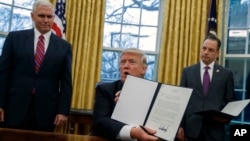President Donald Trump has issued his first weekly address to the American people since taking office a week ago.
In a 2½-minute video issued Saturday on YouTube, Trump listed his administration's accomplishments after a week in office, saying, "This administration has hit the ground running at a record pace. Everybody's talking about it. We're doing it with speed and we're doing it with intelligence, and we will never, ever stop fighting on behalf of the American people."
Trump noted that among his administration's accomplishments over the past week, he had issued an order "to prepare for repealing and replacing Obamacare," the broad health care reform package implemented by the previous administration. "It's about time," Trump added.
Trump also noted the withdrawal from the Trans-Pacific Partnership, a trade agreement involving a number of East Asian nations as well as Chile, Peru, Canada, and Mexico. "That would have been a disastrous deal for our workers," Trump said. He said withdrawing meant the United States could negotiate "one-on-one deals that protect American workers."
Trump also said he issued an order to begin construction of the Keystone and Dakota Access pipelines following a renegotiation of terms, with the requirement that pipelines installed in America be built with American steel and manufactured in the country.
He noted that he issued a directive to expedite permits for new infrastructure and new manufacturing plants.
Border wall
Trump also highlighted his directive to "immediately begin the border wall" on the southern U.S. border with Mexico, where hundreds of kilometers of barrier already exist from previous governmental activity, and "to crack down on sanctuary cities," where undocumented immigrants are not prosecuted for violations of federal immigration law. "They are not safe," said Trump, referring to the sanctuary cities. "We have to take care of that horrible situation."
U.S. presidents have been issuing a regular weekly radio address since the administration of Ronald Reagan in 1982. Reagan picked up the practice from President Franklin D. Roosevelt, who served from 1933 to 1945 and was known for his "fireside chats," a canny use of popular media to deliver his message.
While the White House issues the weekly address (now on internet video and podcast as well as radio), the speaker is not always the president himself. Topics are usually centered on current events, including cultural and annual events significant to Americans.
The opposition party usually delivers an address as well. It is sometimes, but not always, a direct response.





